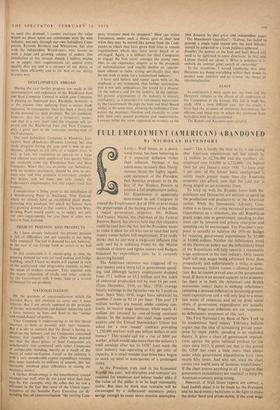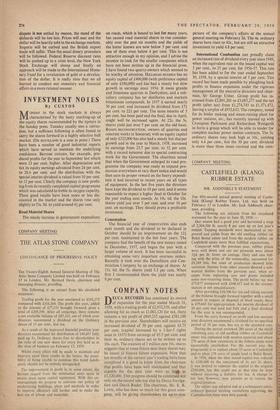FULL EMPLOYMENT (AMERICAN) ABANDONED
By NICHOLAS DAVENPORT
LATELY Wall Street, in a down- ward trend, has been behaving as if it expected deflation rather than inflation. Perhaps it has taken more seriously than Throg- morton Street the highly signifi- cant statement of the President that America proposes to be the first of the Western Powers to jettison a full employment policy. Mr. Eisenhower is apparently determined to ask Congress. to amend the Employment Act of 1946 so as to make the preservation of the buying power of the dollar a major government objective. Mr. William McChesney Martin, the chairman of the Federal Reserve Board, has always held that this objective could be read into the Act, but the President wants to make it plain for all who run to read that hard money comes before full employment. If he really thinks that he can stop a wage-cost inflation (the only sort he is suffering from) by the Martin methods of dearer and tighter money and Budgets balanced by expenditure cuts, he is certainly deceiving himself.
The American recession was triggered off by dear money and a sharp fall in government spend- ing, and although factory employment dropped from 17.1 million to 15.2 million and the index of industrial production fell by over 14 per cent. (from December, 1956, to May, 1958) average hourly earnings in the factories rose by 7 cents an hour. Since May, 1958, wages have advanced by. another 7 cents to $2.19 per hour. This year 2.9 million workers are bound, tinder existing con- tracts. to receive wage increases, while nearly 44 million are covered by cost-of-living escalator clauses. In the summer the steel wage contract expires and the United Steelworkers Union has asked for a new 'model' contract providing '1,250,000 workers with one billion dollars in new money'! This would call for a rise of $800 per worker, which would take more than the industry's total earnings after tax in 1958! Last week the steel industry was operating at 834 per cent. of capacity. it is small wonder that firms have begun to stock up steel in anticipation of a prolonged strike.
As the President truly said in his Economic Rep*/ this year, 'self-discipline and restraint' are essential for employer and labour leader alike if the value of the dollar is to he kept reasonably stable. But does he think that restraint will be encouraged by a deflationist monetary policy savage enough to cause more massive unemploy-
ment? This is hardly the time to try it out seeing that American employment fell last month by 14- million to 62,706,000 and the numbers un- employed rose 616,000 to 4,724,000--the highest total for any January since 1950. To have over 6 per cent. of the labour force unemployed is surely much greater waste than the American economy can afford, now that the cold war is being waged on an economic front.
To keep up with the Russian Jones both Re- publicans and Democrats are anxious to speed up the production and productivity of the American nation. While the Democratic Advisory Com- mittee is in favour of using increased government expenditures as a stimulant, the old Republican guard urges cuts in government spending so that taxes can be lowered and private enterprise and spending can be encouraged. The President's pro- posal is actually to balance the 1959-60 Budget by reducing government expenditures by $3,000 or $4,000 million. Neither the inflationary trend of the Democrat policy nor the deflationary trend of the Republican will help towards a reasonable wage settlement in the steel industry. Only reason itself will stop wages being advanced faster than productivity and unfortunately a strike is some- times necessary before reason is allowed to func- tion. But let reason prevail also at the government level. If there is an unused capacity in an economy (as there is in both the American and British economies today) there is nothing inflationary (meaning a demand inflation) in increasing govern- ment expenditures and it will only lead to a sense- less waste of resources and set up great social stress if government expenditures are actually reduced. Wage-cost inflations are not responsive to deflationary treatment of this sort. • The First National City -Bank of New York in its tendentious 'hard money' February bulletin argues that the idea of stimulating private enter- prise by more public spending is an exploded theory. It gives a chart of government expendi- tures against the gross national product for the years since 1913. It points out that in this period the GNP has risen a little more than eleven times while government expenditures have risen nearly fifty times. And why not, since the chart covers two world wars of fantastic wastefulness? If the chart proves anything at all it suggests that government expenditures are essential to keep the American economy going strong.
However, if Wall Street reports are correct, a final foolish stand is to be made by the President and his hard-money battalions in the fight to make the dollar hard and prices stable. If the steel wage.
dispute is not settled by reason, the stand of the diehards will be too late. Prices will soar and the dollar will be heavily sold in the exchange markets. Imports will be curbed and the British export trade will suffer. Then the usual dreary procedure will be followed. Federal Reserve discount rates will be pushed up to a crisis level, the New York Stock Exchange will slump and finally an approach will be made to the International Mone- tary Fund for a revaluation of gold or a devalua- tion of the dollar. It is really time that we all learned to conduct our monetary and financial affairs in a more rational manner.



































 Previous page
Previous page